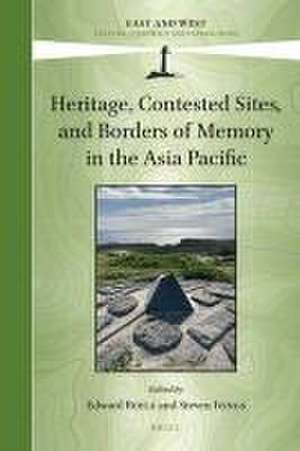Heritage, Contested Sites, and Borders of Memory in the Asia Pacific: East and West, cartea 16
Edward Boyle, Steven Ivingsen Limba Engleză Hardback – 10 oct 2023
This volume, edited by Edward Boyle and Steven Ivings, and with contributions from scholars across the humanities, history, social sciences, and Asian studies, interrogates how particular actors and narratives make heritage and how borders of memory shape the sites they produce.
Din seria East and West
-
 Preț: 348.83 lei
Preț: 348.83 lei - 18%
 Preț: 725.92 lei
Preț: 725.92 lei - 18%
 Preț: 649.97 lei
Preț: 649.97 lei - 18%
 Preț: 699.39 lei
Preț: 699.39 lei - 18%
 Preț: 862.54 lei
Preț: 862.54 lei - 18%
 Preț: 659.85 lei
Preț: 659.85 lei - 18%
 Preț: 585.70 lei
Preț: 585.70 lei - 18%
 Preț: 1188.83 lei
Preț: 1188.83 lei - 18%
 Preț: 946.21 lei
Preț: 946.21 lei - 18%
 Preț: 760.91 lei
Preț: 760.91 lei - 18%
 Preț: 1162.64 lei
Preț: 1162.64 lei - 15%
 Preț: 473.84 lei
Preț: 473.84 lei - 18%
 Preț: 703.53 lei
Preț: 703.53 lei - 18%
 Preț: 966.36 lei
Preț: 966.36 lei - 18%
 Preț: 674.68 lei
Preț: 674.68 lei - 18%
 Preț: 907.04 lei
Preț: 907.04 lei
Preț: 853.85 lei
Preț vechi: 1041.29 lei
-18% Nou
Puncte Express: 1281
Preț estimativ în valută:
163.38€ • 170.58$ • 135.22£
163.38€ • 170.58$ • 135.22£
Carte indisponibilă temporar
Doresc să fiu notificat când acest titlu va fi disponibil:
Se trimite...
Preluare comenzi: 021 569.72.76
Specificații
ISBN-13: 9789004512979
ISBN-10: 9004512977
Pagini: 410
Dimensiuni: 155 x 235 mm
Greutate: 0 kg
Editura: Brill
Colecția Brill
Seria East and West
ISBN-10: 9004512977
Pagini: 410
Dimensiuni: 155 x 235 mm
Greutate: 0 kg
Editura: Brill
Colecția Brill
Seria East and West
Notă biografică
Edward Boyle, Ph.D. (2018), Hokkaido University, is Associate Professor at Nichibunken, and editor of Japan Review. He has published widely on the borders of Japan and the region, Northeastern India, and Palau, including Geo-politics of Northeast Asia (Routledge 2022).
Steven Ivings, Ph.D. (2014), London School of Economics and Political Science, is an Associate Professor at the Graduate School of Economics Kyoto University. His research examines socio-economic change in Northeast Asia, particularly in port cities and Japan’s colonial former empire.
Steven Ivings, Ph.D. (2014), London School of Economics and Political Science, is an Associate Professor at the Graduate School of Economics Kyoto University. His research examines socio-economic change in Northeast Asia, particularly in port cities and Japan’s colonial former empire.
Cuprins
Acknowledgements
List of Figures, Maps, and Tables
Notes on Contributors
1 Introduction: Heritage Sites and Borders of Memory
Edward Boyle and Steven Ivings
2 Regional Language as Mnemonic Practice: Stewarding Place through Storytelling in Rural Japan
Joshua Solomon
3 The Chineseness of Chinatown in Singapore: Chinese New Year Celebrations in a Multiracial Heritage Site
Ying-kit Chan
4 Negotiating War Memories at the Edge of the Former Japanese Empire: Two Japanese Veterans’ Projects in Palau, Micronesia
Shingo Iitaka
5 Hidden Christians Made Visible: An Ethnography of Tourism in a World Heritage Property of Japan
Raluca Mateoc
6 Art in Former Military Sites: Spectres of Geopolitics in the South China Sea
Gabriel N. Gee
7 Framing Negative Heritage in Disaster Risk Education: School Memorials after 3.11
Julia Gerster and Flavia Fulco
8 Marketing the Semi-Colonial as Cosmopolitan: Treaty Port Heritage and the Remaking of Hakodate
Steven Ivings
9 Politics of Heritage: Karatsu’s Takatori-tei as a Meiji Status Symbol, Monument of Modernity, and Symbol of Regional Identity
Arisha Livia Satari
10 At the Border of Memory and History: Kyoto’s Contested War Heritage
Justin Aukema
11 The Legacy of Shinto Shrines at the Borders of Imperial Japan
Karli Shimizu
12 Memorials to Korean Migrants in Kyushu: Overlapping Medieval and Modern Experiences in Local Communities
Jason Mark Alexander
13 Okinoshima, Universal Heritage and Borders of Memory
Edward Boyle
14 Conclusion: Borders, Heritage and What Next?
Philip Seaton
Index
List of Figures, Maps, and Tables
Notes on Contributors
1 Introduction: Heritage Sites and Borders of Memory
Edward Boyle and Steven Ivings
Part 1: Heritage Practices
2 Regional Language as Mnemonic Practice: Stewarding Place through Storytelling in Rural Japan
Joshua Solomon
3 The Chineseness of Chinatown in Singapore: Chinese New Year Celebrations in a Multiracial Heritage Site
Ying-kit Chan
4 Negotiating War Memories at the Edge of the Former Japanese Empire: Two Japanese Veterans’ Projects in Palau, Micronesia
Shingo Iitaka
5 Hidden Christians Made Visible: An Ethnography of Tourism in a World Heritage Property of Japan
Raluca Mateoc
Part 2: Material Matters
6 Art in Former Military Sites: Spectres of Geopolitics in the South China Sea
Gabriel N. Gee
7 Framing Negative Heritage in Disaster Risk Education: School Memorials after 3.11
Julia Gerster and Flavia Fulco
8 Marketing the Semi-Colonial as Cosmopolitan: Treaty Port Heritage and the Remaking of Hakodate
Steven Ivings
9 Politics of Heritage: Karatsu’s Takatori-tei as a Meiji Status Symbol, Monument of Modernity, and Symbol of Regional Identity
Arisha Livia Satari
Part 3: Layered Memories
10 At the Border of Memory and History: Kyoto’s Contested War Heritage
Justin Aukema
11 The Legacy of Shinto Shrines at the Borders of Imperial Japan
Karli Shimizu
12 Memorials to Korean Migrants in Kyushu: Overlapping Medieval and Modern Experiences in Local Communities
Jason Mark Alexander
13 Okinoshima, Universal Heritage and Borders of Memory
Edward Boyle
14 Conclusion: Borders, Heritage and What Next?
Philip Seaton
Index
